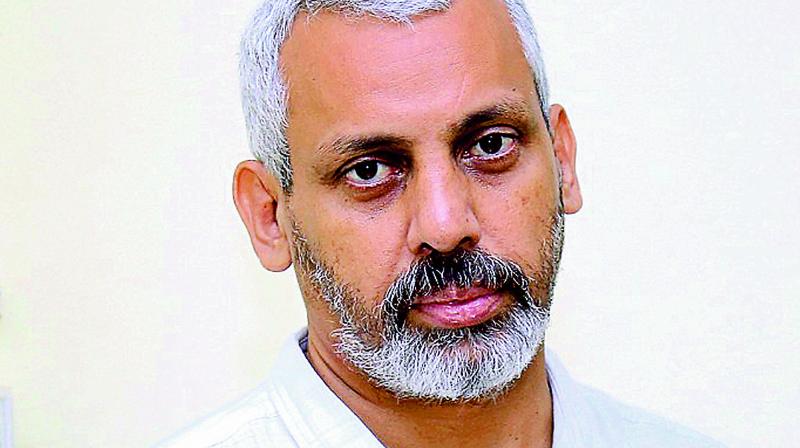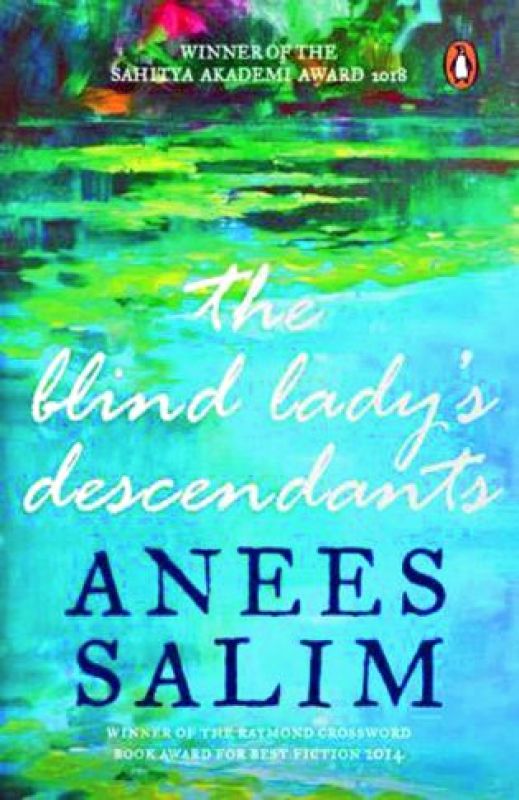Small town tales
Sahitya Akademi Award winner Anees Salim talks about his tales, inspired from his unimaginative childhood, the paths he traversed & the people he met.

When I was young — probably six or seven, not older than eight anyway — our mother would drive tiny nails into the front door to ward off bad luck. Bad luck, then, must have come in through the back door, for, by the time I considered myself grown up — thirteen or fourteen, at most, sixteen — I had started to regard it as a family member — our parents’ fourth child, someone older than me and younger than Sophiya — who would walk away with most of our small fortune much before I turned my present age — twenty-six. Begins writer Anees Salim’s The Blind Lady’s Descendants, which won the Kendra Sahitya Akademi Award in 2018.
 the blind lady’s descendants by anees salim Penguin Books Pp. 304, Rs 399.
the blind lady’s descendants by anees salim Penguin Books Pp. 304, Rs 399.
One aspect that makes Anees’ narrative interesting is this element of humour in the face of tragedy. One can see it throughout The Blind Lady’s Descendants, which is a suicidal note of 26-year-old Amar. “I don’t know how this happens,” says Anees, who has five books to his credit. His other works are Tales from a Vending Machine, The Vicks Mango Tree, Vanity Bagh and The Small Town Sea. “When I was really alone and struggling, what helped me was this sense of humour. When I sit down and write, I like to sprinkle the story with humour. I don’t like to make a story more sentimental than it really is,” adds Salim, whose Tales from a Vending Machine showed how he packaged hilarity in a young woman’s airport lounge experience.
The Blind Lady’s Descendants is autobiographical in parts. “It is set in Varkala, my hometown, and the house I grew up in. The characters are somewhat similar to the people I have grown up with,” says Anees, who, as a child, moved to Varkala, perhaps the only place where the sea has a cliff. “We lived very close to the railway tracks,” he says.
Living in that ambience inspired him to bring the railway tracks and sea in The Blind Lady’s Descendants. “It was a small town. At our ancestral home, I used to stand at the gate watching trains disappearing in the corner. The image stuck with me. That is there in the book, which is written within the transition of metre gauge and broad gauge lanes, which was a big change in those days,” he says.
Giving more insights into his inspiration, he says, “My grandmother was blind. She lost her sight when I was 12 or 13 and regained it 20 years later. Her character — the way she moved, talked and all — inspired me. Also, like in the book, I have three siblings. In that way, the book is autobiographical in patches. I changed the names and the fate. Also, certain things like the tunnel, a prominent element in the book, have been integrated into the landscape.” In the small town, Anees lived as an unhappy child though he says he doesn’t know the reason. His family lived in a somewhat big house and he was lonely all the time. His only solace was reading the books in their home library. In fact, he never loved Varkala during his stay there. “I wanted to escape as I felt it as an unimaginative place. All the while I lived in Varkala, I never frequented the beach. I used to go there only when we had a guest,” he adds. But, he started liking Varkala when he returned home after travelling to various places in India. He cites this newfound love for Varkala as the reason for placing his two books — The Blind Lady’s Descendants and The Small Town Sea there.
Anees was a different child. He was not very fond of school. According to him, going home for lunch was his way of staying away from school. “Being in school for eight hours at a stretch was unimaginative for me!” says Anees. Even now, though his heart desires to revisit his school days, he wants to do it unnoticed, preferably on a holiday.
After school, though he tried to study at a college, the place was too crowded for him. “I stayed there for hardly six months,” Anees recalls. Then, his world became the railway tracks and the dirt road to his home, elements one can find in The Blind Lady’s Descendants. It was not the era of television and he had no friends. The home library, where he got introduced to classics, became his world. His reading expanded as he began frequenting the British Council Library (now closed) in Thiruvananthapuram. “The British Council Library helped me discover beautiful English writers. Going there for books and coming back was like an excursion for me. People were actually confused by my behaviour, especially my parents,” adds the writer.
All the while, he was writing. “I began with short stories. When they got rejected, I started novels thinking short stories were not my cup of tea. I went to Hyderabad and there, I started working on The Vicks Mango Tree, set in Mangobaag,” he adds.
In between, he fell ill, returned to his homeland and later joined the advertising industry. But, he kept writing. Then came Tales from a Vending Machine, which he wanted to be a commercial success. “The idea of Tales from a Vending Machine struck me while I was sitting at Cochin Airport. I saw a girl sitting behind a tea vending machine, something you would see only here. I remember her wearing a scarf. The whole day she sees people coming and going, and I decided to write about it. The book was completed in six months,” says the writer who by that time, had sent his earlier works to almost all literary agents and publishing houses. As he feared they might reject this book seeing his name, he assumed the name Hasina Mansoor, the lead character of the book. “I googled and found a new agent, and sent him a mail in Hasina’s name. In less than five minutes, he asked for the first 30 pages. Within an hour, he asked for the whole book and then the contact number. Then, I revealed my identity. All this happened on a Friday and things were set by Monday,” says Anees, who doesn’t like the idea of attending launches or award-ceremonies.
All this time, his writing had been on the go. New books hit the market and publishers who once rejected him came asking for more. His books have won awards. Interestingly, Anees’ books let readers know more about the Muslim community. For instance, The Blind Lady's Descendants gives a detailed account of circumcision prevalent in the community.
Ask him how his travels within India and abroad have changed his perspectives and contributed to his writing, he says, “I think they hardened me, made me mature. I could see poverty and meet people. I could starve. In a place like Kerala, you don’t see poverty. That made me more courageous,” he says.
Anees feels that the journeys helped him write without inhibitions. “I don’t want something controversial to sell the book. But if I feel that something needs to be written, I write it,” he says. “I am a different kind of traveller. When I go to a
place, I might visit one spot — it could be a path I fell in love with — for 10 days, and I come back with one good sentence,” concludes the author, who is currently working on a book set against the backdrop of Hyderabad.

